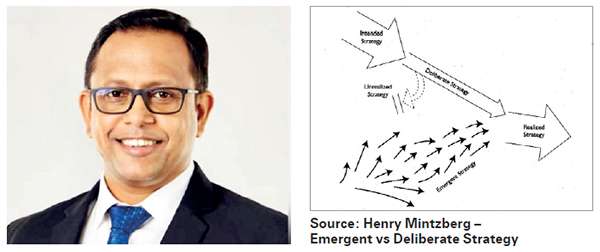Ambidexterity of both Emergent and Deliberate Strategy for Political brand building
Introduction –
 Do strategies need to be planned ahead of time? Is it not possible to manage the process of strategic brand planning in another way? How may the two be combined to create something that performs better? There are various schools of thought associated with this line of reasoning, and the argument has been going on for a while. This article provides an overview of the discussion and discusses why both strategies should be used in tandem with one another to further the development of organisations.
Do strategies need to be planned ahead of time? Is it not possible to manage the process of strategic brand planning in another way? How may the two be combined to create something that performs better? There are various schools of thought associated with this line of reasoning, and the argument has been going on for a while. This article provides an overview of the discussion and discusses why both strategies should be used in tandem with one another to further the development of organisations.
Emergent vs Deliberate Strategies
The two ideas were first presented to the business community in 1978 by Henry Mintzberg, and several discussions have ensued on whether a strategy should be incidental (Emergent) or deliberate (Perspective).
About the concepts –
Mintzberg described strategy as a decision-stream pattern. According to Stacey (2000), strategic management is a process that actively engages discussions on significant new challenges. Based on his ground-breaking strategic contribution—which revolved around the concepts of generic strategies (cost leadership | differentiation), etc.—Michel Porter (1996) defined strategy as the process by which the organisation forges a position for its brands, products, or the entire organisation.
It is clear that strategy must address the environment, regardless of how it is defined. Given that organisations are touched by their surroundings and vice versa, no strategy could be created and implemented that would be limited to the internal environment of the company. Henry Mintzberg (1978) made the initial claim that organisational strategy might derive from both the intended and the emergent more than thirty years ago. His groundbreaking research led to the development of several other models that looked more closely at the process of developing strategies. Mintzberg and Waters (1985) investigate how organisational tactics come to be.
They contrast realised strategies—what the organisation actually accomplished—with intended strategies, which are those that result from a planning process. They offer a framework for analysing the distinctions between these two ideas using a continuum, with the fully planned strategy at one end and the fully emergent strategy at the other. According to Mintzberg and Waters (1985), real-world strategies fall somewhere in between deliberate and emergent The planned strategy, the entrepreneurial strategy, the ideological strategy, the umbrella strategy, the process strategy, the disconnected strategy, the consensus strategy, the imposed strategy, and the planned strategy are the primary categories of strategies that Mintzberg and Waters (1985) determined to be applicable within diverse organisations. Determining whether each of these tactics is intentional or emergent depends on a number of variables, such as the intention of a single entrepreneur, top management, the agreement of all stakeholders, or even the outside world. This will make the control protocols for the strategy’s execution more clear.
Ambidexterity in Political Strategies
The political and economic crisis (the political crisis that resulted from the COVID-19 pandemic’s effect) forced all of the organisations to reevaluate their plans in light of the pandemic, certain changes in fiscal policy, and additional pressure from the global environment, which included the manufacturing sector’s limited material supply, prolonged shipping cycles, and growing challenges in the services sector due to the inability of the latter to communicate with its clientele due to travel restrictions and lockdowns, among other factors.
These outside forces caused the political parties that had earned an almost two-thirds majority to lose the trust of the electorate. Ultimately, one person who had received no trust throughout the election stood up to take the responsibility. By winning over a cabinet of ministers he never appointed, he demonstrated to the entire nation that he was worthy of trust for the work he had done to revive the economy. Therefore, the man who made it all happen pursued a deliberate strategy though it was a knife-edged path. Whereas, certain other political leaders, took the easy way out by only criticizing as it was comparatively an easier approach to build trust.
The goal in both situations was to establish confidence. However, the latter strategy was relatively as simple to implement as the former, which made it harder to establish confidence. Both situations are deliberate though one opted to take responsibility of the situation and the others didn’t. Therefore, we should be grateful to both sides for making the proper choice as the ones on the receiving end. While the others opted out by refusing to take on the responsibility, the one who took on the task made the proper choice by continuing to rely on his experience.
Those who chose not to take the risk, however, shielded their political parties’ future brand value from potential criticism because they understood they would have to face the election. The only distinction was that, once a decision was made, only one side had to exert themselves; the others were not subjected to the strain of reinstating the economy or in other words, delivery. They had to only focus on building their political brand and campaigns to face the election. But in pursuing their plans, each party encountered an ambidexterity between what was planned and what occasionally appeared in the surroundings.
However, it was challenging to explain the former to the general people because revitalising the economy required making many difficult decisions and taking a lot of time-consuming steps. In contrast, the latter was relatively simpler because the people (consumers) already harboured certain doubts about the one who took the challenge rather than on the ones who didn’t accept the challenge.
Conclusion
Strategies is not a speech or a story shared on social media. It’s about real action and an actual struggle. They are meant to be for execution. They are to be executed and produce outcomes/ results. Strategic thinking without execution is hallucination. Therefore, the existence of both emergent and deliberate aspects of strategies are appreciated in strategy execution and ambidexterity of both emergent and perspective strategies are important for success. Most of the government sector organizations can be restored and be made profitable if the officials and the employees work with the intention of turning them around instead of playing the blame game and politics inside the organizations.
Organizations are made by people. We have the power to make a visible change. If we are truly committed to serve the country, making organizations profitable will be the best approach than ganging up under political labels. The time has come for Sri Lanka to continue the greatest efforts taken in the recent past to recover the economy. It’s not a time to argue and debate who is right and who is wrong. Because as per IMF, we were the fastest to recover and we are on a knife-edged path. We have no chance of trying or considering new brands at this point in time.
If it’s an FMCG brand, we can always throw it away and go buy the same brand again. But in the case of an election, there is no chance for us to change the brand for five years. We are buying a brand for five years. Though the political brand owners and creators can take the risk and launch anything to the people, it’s the people who will have to suffer by taking a wrong decision. Advertising can create awareness and consideration. After considering all available options, we opt to choose the best option given out of the options. Once chosen if the selected political brand doesn’t deliver, we are stuck for five years.










































.jpg)
.jpg)
.jpg)
.jpg)
.jpg)
